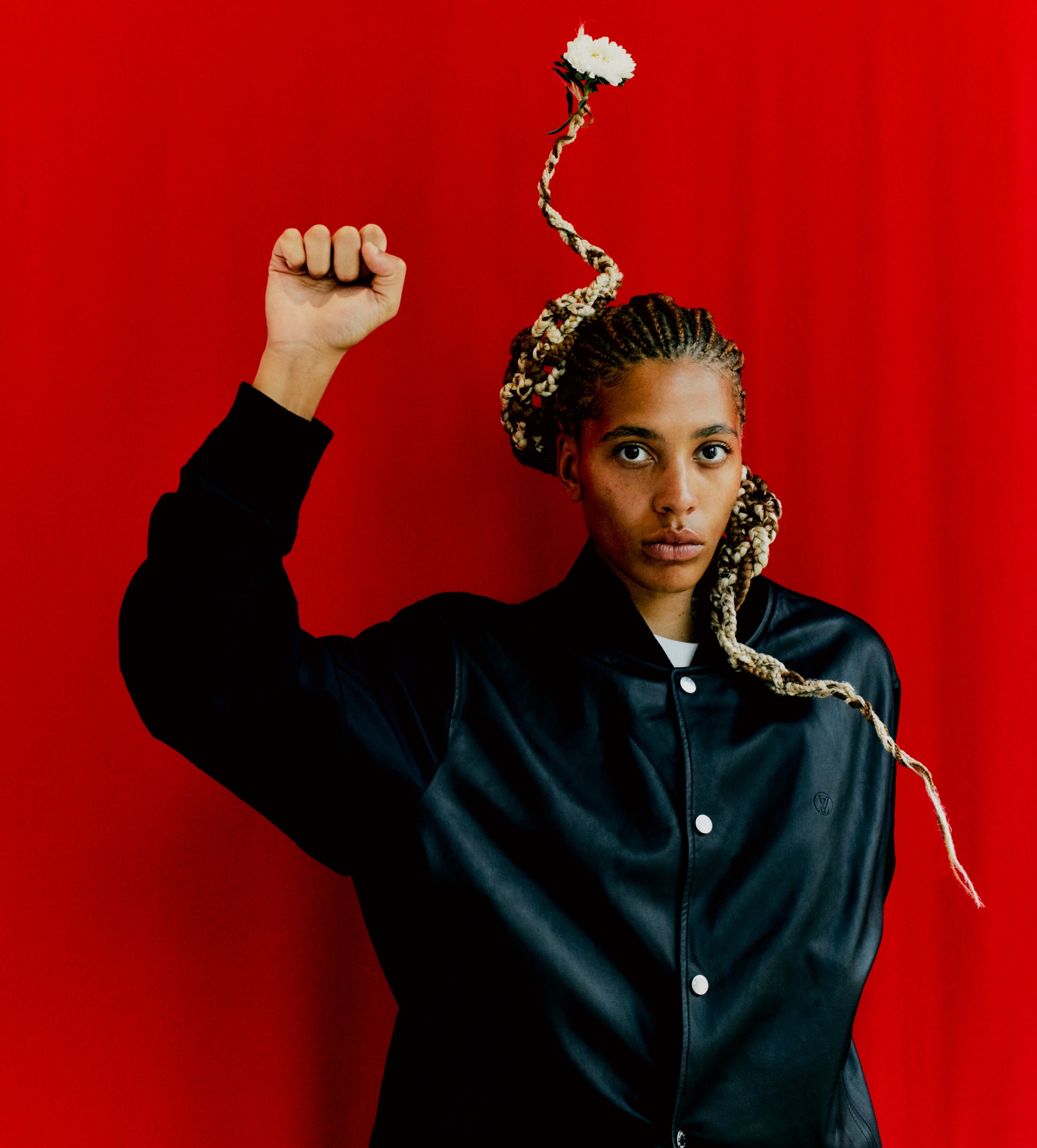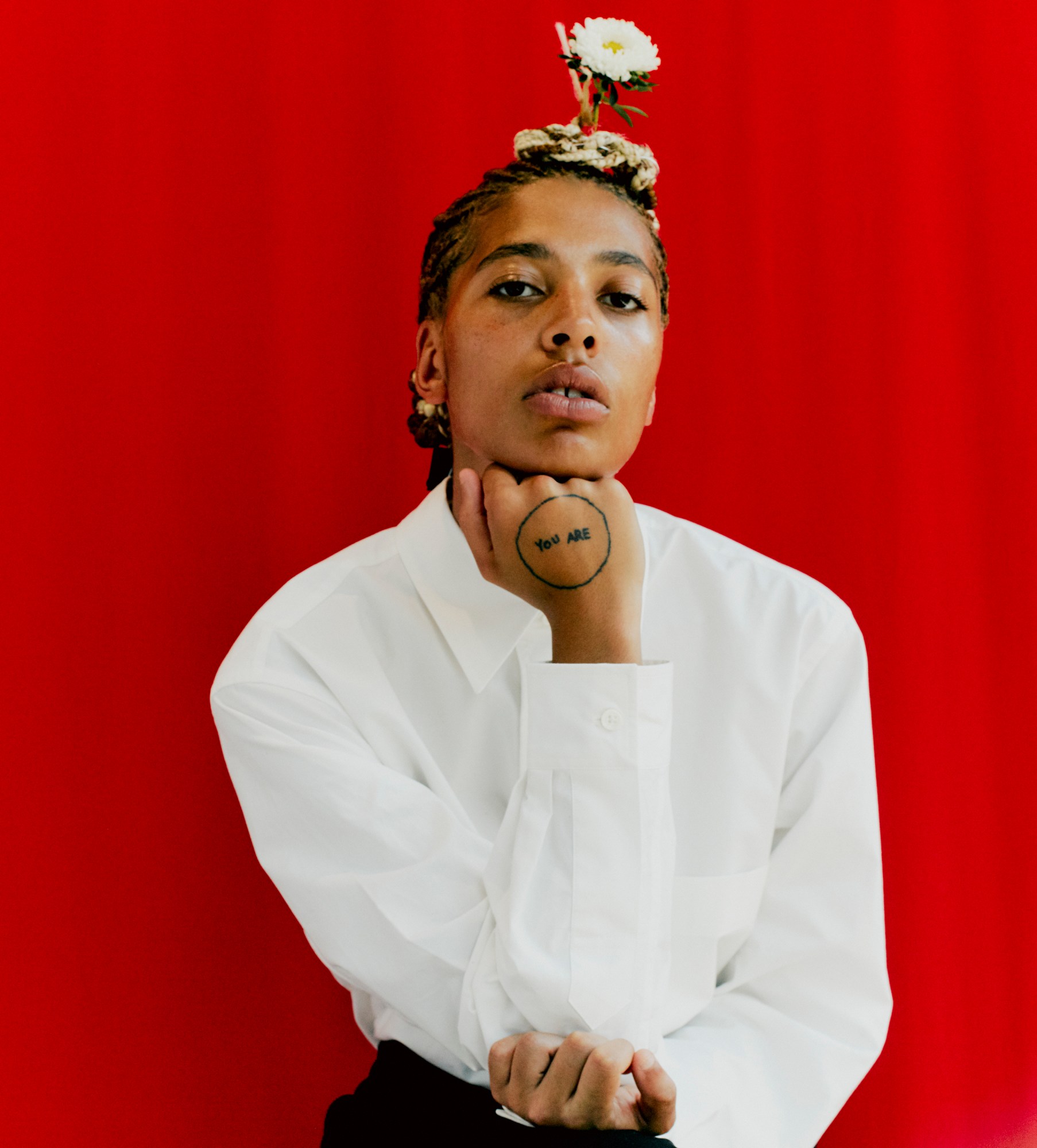This story originally appeared in Up + Rising, a celebration of extraordinary Black voices, and is the first chapter of i-D’s 40th anniversary issue (1980-2020).
i-D chronicled over 100 activists and artists, musicians and writers, photographers and creatives, in Atlanta, Baltimore, Minneapolis, LA, London, New York, Paris and Toronto.
Kai-Isaiah Jamal is sat by a pool in Mykonos. We, much as we’d like to be, are not – though we certainly haven’t earned the break as hard as they have. During a period in which the world all but ground to a halt, their trajectory has only accelerated, their poetry and its message of hope touching more lives than ever before.
The work Kai’s been doing in isolation, though, hasn’t just been professional, it’s been personal and emotional, too. “I think lockdown was a necessary time. We never really get the moment to reset and reevaluate. Before, I was presenting as very, very masculine, as a trans man,” they share. “During lockdown, being able to really sit there and experience my body in complete stillness, it kind of allowed me to arrive at this point of gender-nonconformity. Without lockdown, I don’t know if I ever would have had the time to think about it as much as I did.”
The journey to this realisation has been neither smooth nor linear. Kai recalls how, prior to it, “non-binary and gender-nonconformity felt so alien to me,” something they in part ascribe to the lack of people who look like them in mainstream discussions around non-binary identity.
“The first person we usually see is maybe Sam Smith, which is amazing, I think that visibility is so vital when it’s so widespread,” they say. “But when the poster face for it doesn’t really look like you or talk like you or navigate the world in the same way, it does bring up this idea of whether you’re afforded the privilege to allow yourself to sort of use this language.”
For Kai, a key feature of this chapter of their transition entailed “finding ways to decentre whiteness,” researching “pre-colonial identities that exist in so many cultures, especially Black cultures where there are third genders, lack of genders, words for non-binary before we had ‘non-binary’. I guess it was also about remembering that, as somebody who enjoys playing with language, I can make words for myself.”

This playful approach to language is also the bedrock of their poetic practice, which they first began to hone at school in south London. “The biggest thing in Year 8 and Year 9 was people rapping in the playground, very much firing these weird little ciphers at each other.” A love for the Romantic poets they studied in English formalised an instinctual interest, though a canon exclusively populated by cis-gendered white men in the vein of Keats and Coleridge left them feeling pretty excluded. “I found them really amazing and there’s a lot of their influence in my work, but there was never a space for blackness or queerness or transness in it,” they reflect.
It was discovering slam poetry that reconciled that sense of non-belonging with a space where there were “Black gay people who looked like me, saying things that like resonated with me. People were talking about immigration and slavery, things I’d never realised existed in the poetry sphere. It was there I really realised the power of the written language, as well as of the way it’s spoken.”
Since then, the value, nuance and depth of their work have been recognised beyond the boundaries of any one poetic niche. London’s ICA, for example, appointed Kai their first-ever poet-in-residence. And they’re also working on their first anthology of poems. Despite these benchmarks of success, however, a minority of critics continue to assess their work against snobbish metrics that bear no relevance to their work. “So many poems of mine are ‘grammatically incorrect’, which is hard to even say because, in my head, that’s not the point,” they say. “It’s this elite and white idea of written work and I don’t ever exist in that. And it took a long time to realise that so many people who were interacting with my work because it wasn’t that. I don’t need to reduce my work for it to fit everybody and be accessible to everybody.”
As Kai’s profile has risen – as a poet, activist and also as a model for brands including FENTY and Valentino – they’ve increasingly had to scrutinise the dynamics of their relationships with the organisations they work with. “It’s been difficult! There’ve been so many times I have to sit down and I’m like, who benefits from this?” they ponder. “And there are so many times where I know I’m ticking a diversity box – and I tick quite a few.” They also stress that visibility and representation, while important, don’t necessarily translate to safer spaces in the real world. “We’re at this stage of everyone being like, ‘We have visibility! We have representation!’ I’m like, Yeah, but we’re also experiencing an epidemic of violence against the people being made visible,” they say, highlighting the duty of care often neglected by the platforms hosting them. “I’ve done work for publications on Instagram, and it’s amazing, but then you get the backlash from trolls, people sending you death threats, or people calling you a tranny or a nigger.”

It’s clear – placing diverse faces on billboards and printed pages doesn’t add up to enough. We need to do more to ensure the security and wellbeing of those whose likenesses feature on them, to change the fact that the average life expectancy of Black trans women in America is just 35.
For the most vulnerable members of our communities, the imminent proximity of death is a cold, cruel reality. Just days before our conversation, Instagram was ablaze with a video that showed three trans women of colour – Joslyn Allen, Jaslene Busanet and Eden Estrada – being attacked by a man armed with a crowbar on Hollywood Boulevard. A surrounding crowd, which comprised numerous Black members, simply recorded or looked on. “The idea that there are Black cis men and Black cis women standing there laughing… that said so much more than the attack in itself,” Kai says. “It was complicity, saying ‘I’m gonna stand by and watch this happen and not say anything because I also agree with it.’ Black liberation cannot exist without us, we can’t be left behind.”
But violence and suffering cannot be the only factors that condition how we see and relate to trans people, they stress: “We’re in this kind of epidemic of violence, but it’s so vital to see trans people thriving and enjoying their life. People forget that there’s also that to us. It’s very dangerous to perpetuate this narrative that being trans is something we should fear and be worried about. If all the generation below us sees is trans people dying or getting their rights taken away, there’s a point where they’ll ask: Why would I ever want to live that life? Why would I ever want to come out?”
“There are so many amazing things about being trans. I laugh all the time, saying I’m a shapeshifter. I can go from like looking so femme to so masculine that my dealer or my corner shop man has no idea. Sometimes it’s like a superpower; sometimes I think it’s my most amazing quality. And I just hate people’s pity, it’s so condescending,” they continue.
As much of a superpower as it may be, what Kai most looks forward to along life’s long line couldn’t be more routine. “Not right now, but I’m really looking forward to becoming a parent,” they say. “There was a long period of my life after coming out where I was like, I will never, I never find love, a future. I will never find this kind of home life. Just knowing that I will be a figurehead to someone, and that I will hopefully be able to give kids a future in a world that is so far away from the world that we have lived, that’s a really big thing for me.” If that’s an unexpected response, the question that begs asking is: why? We are all, after all, entitled to life’s essential joys, whether that’s falling in love, the comfort of family company, or just feeling the sun on our skin – whether by a pool in Mykonos or elsewhere.
Credits
Photography Rafael Pavarotti.
Styling Ibrahim Kamara.
Hair Virginie Moreira at MA+World Group.
Styling assistance Mark Mutyambizi and Marina de Magalhaes.
Hair assistance Charles Stanley.
Casting Samuel Ellis Scheinman for DMCASTING.
Casting assistance Alexandra Antonova.
